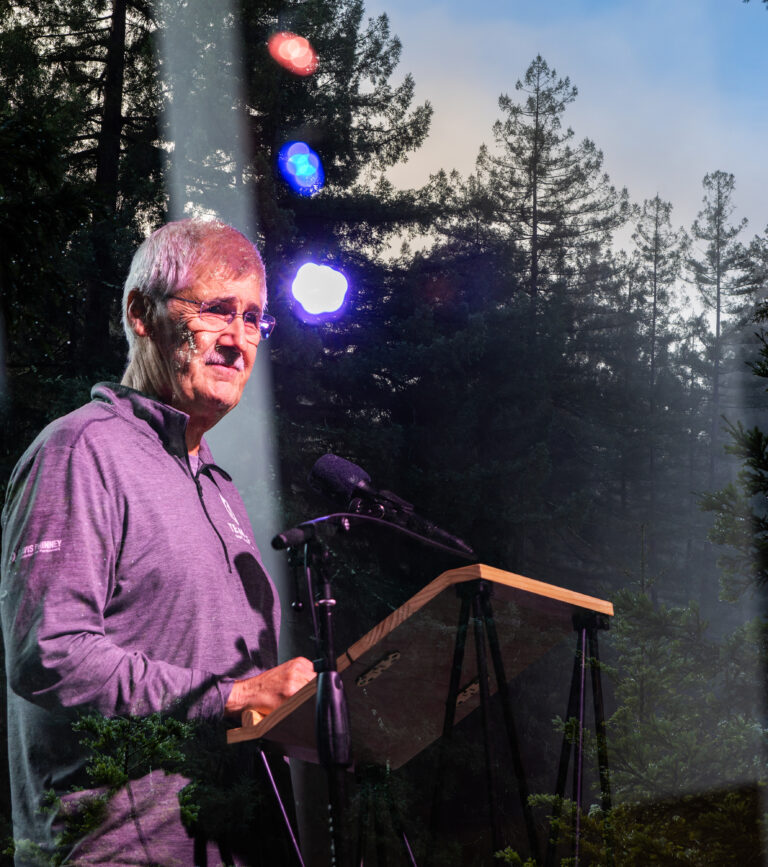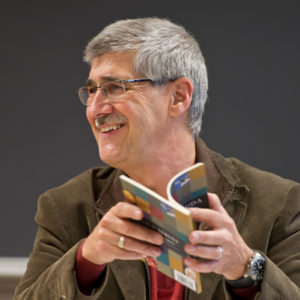John Paul Lederach
Poetry from the On Being Gathering
A long weekend framed by poetry, anchored in live On Being conversations, with generous unscheduled replenishing space — a convening of the generative narrative of our time — at the 1440 Multiversity in the redwoods of Scotts Valley, California.

Image by Bethany Birnie, © All Rights Reserved.
Guest

John Paul Lederach is a senior fellow at Humanity United and professor emeritus of international peacebuilding at the University of Notre Dame. He is also the co-founder and first director of the Eastern Mennonite University’s Center for Justice and Peacebuilding. In 2019 he won the Niwano Peace Foundation Peace Prize.
Transcript
[applause]
John Paul Lederach: Good morning, everybody. My good friend Akwasi Aidoo, who I work with, often starts his comments with the phrase “Before I speak, I have something to say.” [laugher]
So, prior to haiku-ing, many years ago, I started this journey with haiku, and it’s become a daily or near-daily practice. This sort of notion of the haiku attitude “[to] prepare yourself to be touched by beauty.” To pause, to notice, and to note in the simplest of forms, this complexity around us — this 5-7-5 finger tapping of the syllables. So the rhythm of the sounds, not necessarily the core of the words.
It came to be in time that I started listening in haiku, which was different than writing haiku. And that was that, there was, I suppose, a kind of a sensitivity that when people spoke, I brought it into my body by way of that rhythmic tapping, that I was noticing it more. And what I’ve found is that when people come closer to their truth, phrases shorten, reflection rises, and clarity sharpens.
Now we do massive amounts of wandering to get there. But when it comes, then it creates the haiku moment. And the haiku moment, according to those that study this particular form, this simple, simple form, is the haiku moment is when a part of the world is revealed for what it is.
And I experienced that, especially that a part of the inner world, when I hear it from people, part of the inner world is revealed, unveiled for what it is. And there’s a generosity of reception that’s needed for that level of vulnerability. So my inclinations are to take note, arrange what I’m hearing, and then offer it back to the speaker. Offer back the spoken to the speaker. Conversational haiku, a small gift in a tiny container.
Haiku, I think, is a way of listening and sitting with complexity.
We inhabit a century, we inhabit a century that requires radical listening. Rooted, radical, rooted listening. Emplaced listening, poetic listening. To incline the ear of the heart, as Saint Benedict put it so long ago.
So I got a call from Krista. This happens, you’ll find that it happens. Nobody doesn’t answer the call from Krista. Krista asked if I might offer haikus, noticed across these three days, back to this Gathering. I’ll confess that I see no possibility of any container holding this Gathering. The hearts have flooded, the words are running off the pages. Among the things that I learned from the old masters who originated and became known for haiku, that while it is a form of listening and presence, it is also a form of play. It’s playful. And to date, I have found no scientific evidence — let me repeat that, as an academic — I have found no scientific evidence that being serious leads us into greater understanding of the human condition than being playful.
[laughter and applause]
We do have evidence that playfulness unleashes aliveness. So I will have a bit of playful here.
For this morning, I have landed on 27 haiku from the three days, maybe a tribute to Hannah’s joy, or the 27 times infinity that I found in Drew’s joys. I will follow the main events, and I’ve thrown in a few of my own because Krista also wrote me a note that said, “Do you have any spider haikus?” [laughter] Indeed. So, a few will drop in.
There is one challenge before I jump to the haiku. Midway, there is a word that came in a perfectly formed gem of a five-syllable line from Janine. I discovered that I have never in my life pronounced this word in any conversation or in public, though I have written it. And that when I started to phonetically pronounce this word, it put me in interesting landscapes of danger.
[laughter] So I did the AI thing and I went to the Google Pronounce, and I found a dozen pronunciations. So this is the first moment of audience participation. The word is “fecund.”
Can you all say that with me?
Lederach and Audience: Fecund.
Lederach: The gem of the five syllables that you’ll hear partway through the reading of the 27, the gem: “Life is so fecund.” Can you say that with me so that if I mispronounce, you all are participating in the mispronunciations? OK, here we go.
Lederach and Audience: Life is so fecund.
Lederach: OK. I feel more comfortable. That was like the trailer to the movie. [laughter] So, now normally with the haikus, I’m going to follow the agenda that we had with the titles more or less that are there so that you can place where they’re coming. These are conversational, meaning these are things I heard and I’ve arranged and I’m placing back for you to receive and hold and reflect on. I discovered, through part of our conversation and through my own experience, that we don’t come to places without taking note of what has come before we arrived.
And I think yesterday, what had come before we arrived, made its arrival, began to bubble. Because any group that cares as much as this group cares, will care about the suffering of humanity, and will care about the convictions that they have with reference to that suffering. So I would like to start with a small category titled “Before We Arrived.”
I have actually written many haikus since October 7, since the outpouring of a period of such dehumanization in the weeks and months that have flowed, that sometimes my body can’t take it. I’ve only chosen two. I chose not to write essays like I have in the past. I chose to write handwritten notes of encouragement to people I know, on all sides, who have felt their lives torn.
“Gathering Haiku”
(noticed, evoked, arranged, shared)
The On Being Gathering 2024
Before We Arrived
Ode to the breaths we lost
i.
eucalyptus leaves
swirl and fall in desert winds
incessant laments
ii.
I can’t sleep at night
I keep hearing a child’s cry
under the rubble
Preliminaries
1.
liminal remarks
before, during, and after
we live in-between
2.
visibilizing
connective tissue our eyes
letting us see us
3.
emergence unfolds
they keep coming not minding
the uncertainty
Off The Wall 1
4.
heavy with silk
spider pauses to witness
the sound of patience
Biomimicry
5.
anciently knowing
and relentlessly birthing
Mimi cries out
6.
How to make tree food
listen for the faint
voices from the far edges
tremble with respect
7.
welcome the pooping
seeds abound sealing good stuff
preparing healing
8.
pleasures of flowers
juiciest fruit exploding
time is on our side
9.
outside my window
twin redwoods only bark seen
rough holding softness
10.
poetic spirit
see what this HERE teaches me
life is so fecund
Off The Wall 2
11.
I misread the screen
convening the garden tales
mushroom fern lily
A Surgeon General Speaks
12.
people have layers
you must go deep to touch soul
audacious spirit
13.
what the soul longs for
to be seen and to be known
to feel alongsideness
14.
what is it all for?
to serve, to unleash, to love
connected and whole
15.
hand on heart eyes shut
remember your web of love
you are not alone
Listening for Hannah and James and …
16.
real world politics
mirroring each other’s light
to find our way home
17.
see this world from the
perspective of another’s life
twenty-seven times
18.
exquisitely precious
dignity made between us
joy the justice gift
19.
truth supple enough
to hold our mysteries
we keep beginning
The Wisdom We Need
20.
unprecedented
at the expense of the whole
optimization
21.
flows of attention
aware of human frailties
blind to incentive
22.
adolescents play
games Promise or Peril and
Cat In Bag … or not?
Off The Wall 3
23.
under mother tree
stretching into the heavens
a speck learns to gaze
Epilogue: As We Take Part
24.
maybe the wisdom
we need is within, between
and surrounding us
25.
rain fell so softly
feeding the whole forest and
never made a sound
26.
morning sun traces
spiders’ night moves holding the
garden together
27.
beyond all the noise
hidden in wind-rattling leaves
birdsonging persists
Laderach: Bless all of you because you’ve blessed me. Thank you.
[applause]